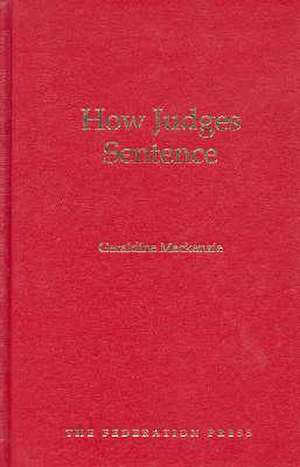How Judges Sentence:
Autor Geraldine MacKenzieen Limba Engleză Hardback – 30 apr 2005
Preț: 243.63 lei
Preț vechi: 763.08 lei
-68% Nou
Puncte Express: 365
Preț estimativ în valută:
46.62€ • 48.68$ • 38.50£
46.62€ • 48.68$ • 38.50£
Carte indisponibilă temporar
Doresc să fiu notificat când acest titlu va fi disponibil:
Se trimite...
Preluare comenzi: 021 569.72.76
Specificații
Cuprins
Contents Introduction Judges and the sentencing process Sentencing and Judicial Discretion Sentencing Aims and Purposes On Law and Order, Public Opinion and the Media A Question of Balance
Recenzii
A new book on sentencing holds something for all criminal practitioners and judges. A delightfully succinct and well-written book, it weaves a delicate lacework linking theory and practice with witty insights into judicial reasoning on sentencing. There are many witty insights into judicial reasoning on sentencing based on actual comments from judges in the interviews conducted by the author. … There is also a great deal of both theoretical and practical knowledge woven into the text. It is more than an academic work. .. [It] will be of interest to all criminal practitioners and judges. Criminal law students and academics will also find it valuable. Members of the public and the media will gain an insight into the real difficulty that sentencing poses for judges, who, ultimately, must balance many factors. Queensland Bar News No 16, August 2005 The results of the author’s work do indeed provide insights into sentencing practice and she sets out with a great deal of success to examine judicial perceptions, methodology and attitudes towards the sentencing process as seen through the eyes of these judges. … This is a very interesting book and well worth reading, especially for the large number of quotes from the judges. NSW Bar News, Summer 2005-2006 Judges often have great difficulty because of the complexity of the facts and sentencing law, the need to balance the various aims of sentencing, the range of options available to them and the widely differing personal circumstances of offenders. The ever watchful eyes of the media, the oversight of courts of appeal, the views of victims and the force of public opinion ensure that the sentencing process, while lonely, is never secret or unaccountable. This book, based on the author’s PhD, is an attempt to understand sentencing from the judges’ point of view. … there have been few attempts to gauge sentencers’ perceptions about issues such as how they make their decisions, the purposes of sentencing, the degree of discretion afforded to them, the influence that public opinion has on their sentencing behaviour and the stresses that the responsibilities of sentencing place upon them. This should prove a useful book for sentencing scholars and policy makers and possibly for a broader market which is mystified by the criminal justice system and the actions of the courts. Professor Arie Frieberg, Australian Policy Online 25 August 2005
